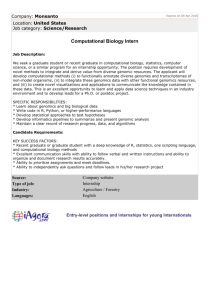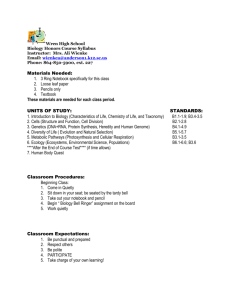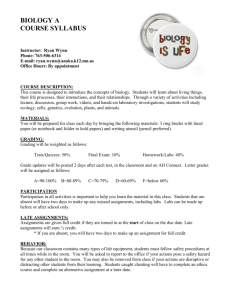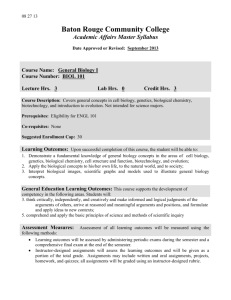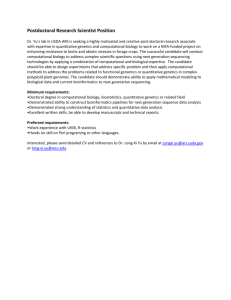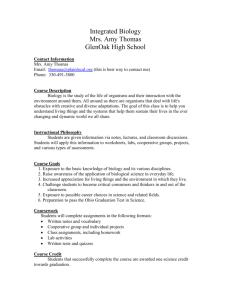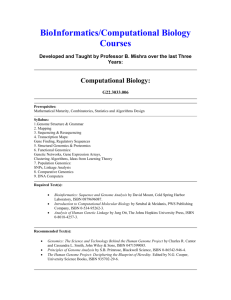Instructor: Terry Furey - UNC Chapel Hill: Department of Biology
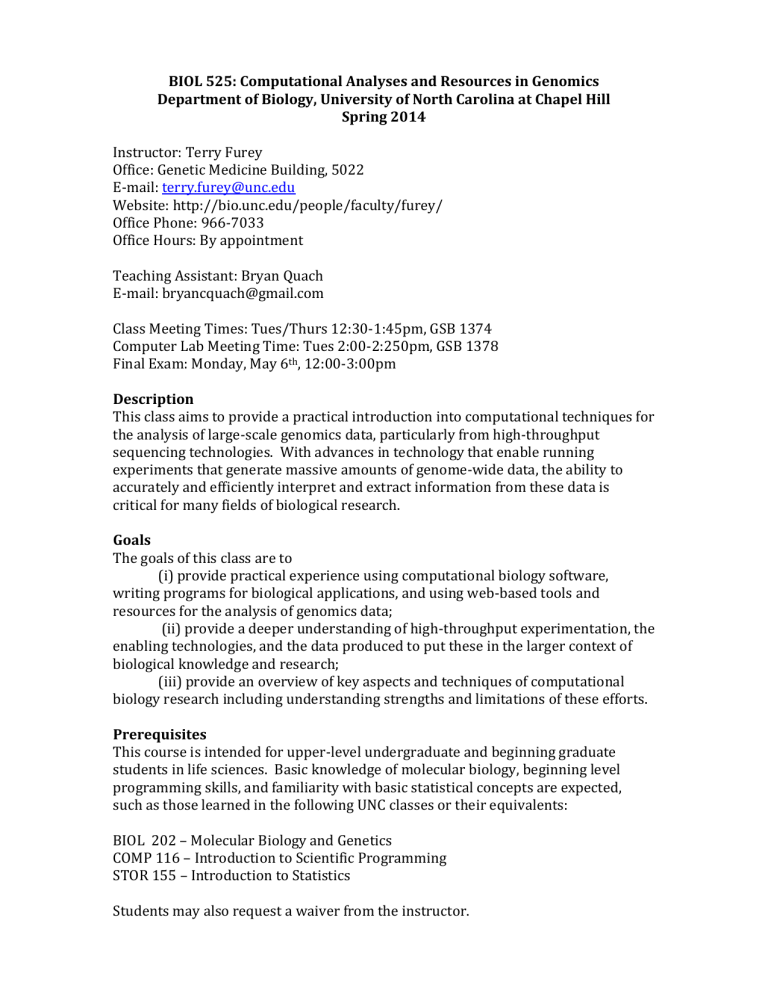
BIOL 525: Computational Analyses and Resources in Genomics
Department of Biology, University of North Carolina at Chapel Hill
Spring 2014
Instructor: Terry Furey
Office: Genetic Medicine Building, 5022
E-mail: terry.furey@unc.edu
Website: http://bio.unc.edu/people/faculty/furey/
Office Phone: 966-7033
Office Hours: By appointment
Teaching Assistant: Bryan Quach
E-mail: bryancquach@gmail.com
Class Meeting Times: Tues/Thurs 12:30-1:45pm, GSB 1374
Computer Lab Meeting Time: Tues 2:00-2:250pm, GSB 1378
Final Exam: Monday, May 6 th , 12:00-3:00pm
Description
This class aims to provide a practical introduction into computational techniques for the analysis of large-scale genomics data, particularly from high-throughput sequencing technologies. With advances in technology that enable running experiments that generate massive amounts of genome-wide data, the ability to accurately and efficiently interpret and extract information from these data is critical for many fields of biological research.
Goals
The goals of this class are to
(i) provide practical experience using computational biology software, writing programs for biological applications, and using web-based tools and resources for the analysis of genomics data;
(ii) provide a deeper understanding of high-throughput experimentation, the enabling technologies, and the data produced to put these in the larger context of biological knowledge and research;
(iii) provide an overview of key aspects and techniques of computational biology research including understanding strengths and limitations of these efforts.
Prerequisites
This course is intended for upper-level undergraduate and beginning graduate students in life sciences. Basic knowledge of molecular biology, beginning level programming skills, and familiarity with basic statistical concepts are expected, such as those learned in the following UNC classes or their equivalents:
BIOL 202 – Molecular Biology and Genetics
COMP 116 – Introduction to Scientific Programming
STOR 155 – Introduction to Statistics
Students may also request a waiver from the instructor.
Weekly Topics
Week 0 (1/9): Introduction to computational genomics
Buy books!
Week 1 (1/14, 1/16): Operating systems, linux, and choosing an editor
Intro to operating systems, linux
Lab: Getting familiar with the virtual computing lab (VCL), linux
Week 2 (1/21, 1/23): Perl programming, part I
Chapters 1, 3.1-3.2, Building Bioinformatics Solutions (BBS)
Lab: Introductory perl programs
Week 3 (1/28, 1/30): Databases, mysql queries, and importing data
Chapter 2, BBS
Lab: Creating and using a MySQL database
Week 4 (2/4, 2/6): Perl programming part II
Chapter 3.4-3.9, BBS
Lab: File input/output, using mysql databases in perl programs
Week 5 (2/11, 2/13): DNA sequencing and analysis overview
Chapters 1-3, Next-Generation DNA Sequencing Informatics (NGDSI)
Lab: The UCSC Genome Browser and database, file formats
Week 6 (2/18, 2/20): DNA sequence alignment
Chapter 4, NGDSI
Lab: Aligning short read sequences with BWA
Week 7 (2/25, 2/27): Genome Annotation
Chapter 7, NGDSI
Lab: Displaying annotations in the UCSC Genome Browser
Week 8 (3/4, 3/6): Gene regulation, ChIP-seq Part I
Chapter 9, NGDSI
Lab: TFBS peak calling with MACS
** Spring Break (3/10-3/14) **
Week 9 (3/18, 3/20): ChIP-seq Part II
Lab: Histone modification peak calling with dFilter
Week 10 (3/25, 3/27): Cluster computing, high-performance computing, analysis pipelines and sequence quality control
Chapter 12, NGDSI
Lab: Creating pipelines in Perl
Week 11 (4/1, 4/3): Gene transcription, RNA-seq
Chapter 10, NGDSI
Lab: Bowtie, Cufflinks RNA-seq pipeline
Week 12 (4/8, 4/10): Open chromatin (DNase-seq, FAIRE-seq)
Journal Papers
Lab: Open chromatin analysis pipeline
Week 13 (4/15, 4/17) : Genetic Variation, finding and analyzing DNA variants in sequence data
Chapter 8, NGDSI, Journal Paper
Lab: GATK variant calling pipeline
Week 14 (4/22, 4/24): Metagenomics
Chapter 11, NGDSI
Lab: Analyzing metagenomic data
Reading and Resources
There are two required books for this course:
Building Bioinformatics Solutions, by Conrad Bessant, Ian Shadforth, and Darren
Oakley. Oxford Biology (2009)
Next Generation DNA Sequencing Informatics, edited by Stuart M. Brown. Cold
Spring Harbor Press (2013).
Additional reading will be assigned from other sources.
The Sakai system at UNC ( http://sakai.unc.edu
) will be used extensively to provide instructional material, assignments including student submission and grading of assignments.
Computer Labs
This course includes a weekly one-hour computer lab. The labs will be designed to complement topics in class and provide more practical instructions on specific genomics resources such as at the NCBI and the UCSC Genome Browsers, and the
Galaxy sequence analysis pipeline system. Additional instruction to help complete class assignments will also be provided.
Grading
Grades for this course will reflect the ability of the student to master both the theoretical and practical aspects of this course. These will be assessed through graded computer-based assignments, which will involve programming in some instances, and a final exam. Late homework assignments will be penalized 10% a day, cumulatively. This means that an assignment three days late will be penalized
30%. Exceptions will be made by prior approval by instructor. Final grades will be
A
B computed as follows:
Class participation (10%)
Homework: (65%)
Final exam (25%) – will include concepts from the whole semester.
A 10% grading scale will be used, meaning:
90% - 100%
80% - 89%
C
D
F
70% - 79%
60% - 69%
<60%
Honor Code
Computational genomic research is, in general, highly collaborative and open. That being said, students need to learn to independently perform the work assigned in this class. Students are encouraged to help classmates understand general concepts and techniques learned in class, even related to homework assignments, but under
no circumstances should complete answers, computer code, or the like for homework be shared. Specific questions about individual homework assignments should be discussed with the professor.
The in-class final exam will be open note, open computer, and open Internet, but must be completed independently by each student.
Syllabus Changes
The professor reserves to right to make changes to the syllabus, including project due dates and test dates. These changes will be announced as early as possible.
